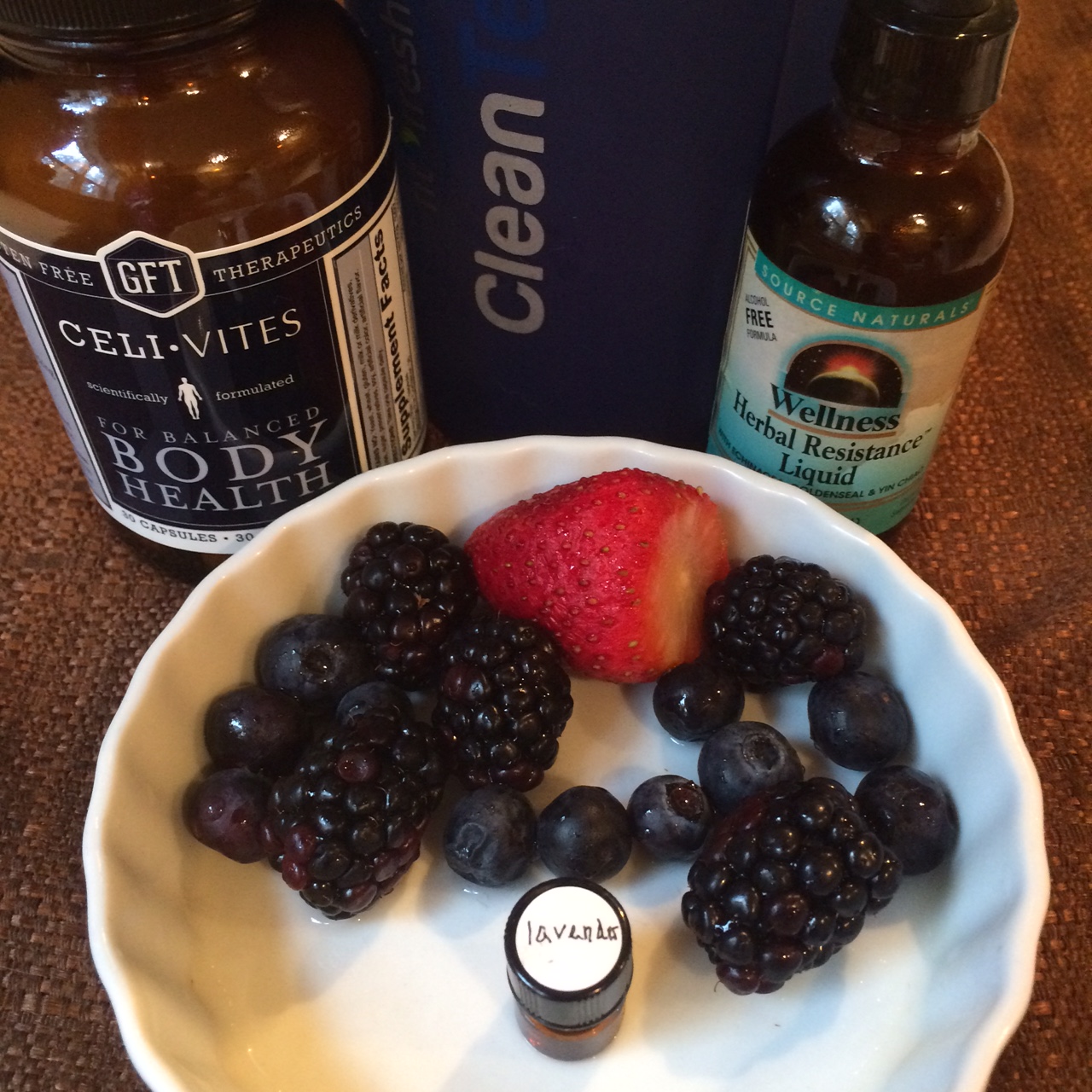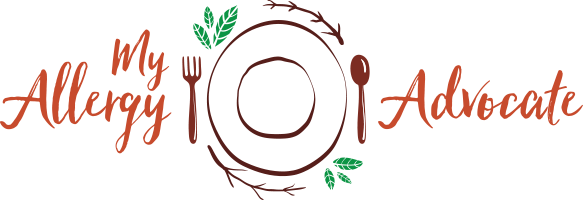
What are your go-to’s when you have cold or flu symptoms, and you can’t use conventional treatments because of food allergies or autoimmune disease?
Disclaimer: this post is not a replacement for sound diagnosis and medical treatment when you are ill. It is a discussion of resources available. Always discuss with your medical practitioner any questions and changes in treatment you wish to explore.
What happens when you have symptoms of a cold or flu, and you have an autoimmune disease and/or food sensitivities?
Some of the conventional over-the-counter products are not going to work for you, that’s what! Today, while I type on my Macbook Air from bed, I have the symptoms of a typical head cold: post-nasal drip, irritated sore throat, no fever, headache, body soreness, and fatigue. I thought it would be timely to post some “food for thought” on how to approach treating your cold and flu symptoms if you have an autoimmune disease and/or food allergies, intolerances, or sensitivities.
I’ve organized this post into steps so you can access what you might need to address the threat of cold and flu symptoms. While no one enjoys getting sick, sickness happens. I think it’s best to be prepared at all times, and have a general outline of your plan to treat your illness before they overwhelm you.
Step One: Assess the Threat
Recently, I started experimenting with conceptualizing cold and flu treatment like our government does about security. Our government refers to our security status using DEFCON categories one through five, with one being the most serious level of readiness to act on a known threat, and five being the least level of readiness, as there is no known threat. In thinking about the immune system, our bodies can be at various levels of readiness for the Command Center to react to threats against it.
My cold, flu, and serious Upper Respiratory Illness DEFCON list looks like this:
DEFCON 1 – launch the “nukes” by going to the doctor for antibiotics, 02 saturation levels evaluated, nasal decongestant spray, inhaler, heavy cough syrup (make sure it is corn free, no caramel coloring), strict bed rest, fluids, stay home from work.
DEFCON 2 – treat symptoms with OTC meds that are allergen free, bed rest, fluids, steam room, may be able to go to work if not contagious or no cough, restrict social activity to prevent transmission. Decrease exercise (gentle yoga and walking permitted). Eat anti-inflammatory foods and avoid all foods that promote congestion (i.e. dairy, if you are not already eating a dairy-free diet). I also cuddle up with my “Purrito,” Ms. Loomi, as her kitty purr resonance is part of my healing strategy!
DEFCON 3 – Exercise permitted, treat symptoms with non-medicinal options (chicken soup, bone broth, rice, vitamins), nasal cleansing with Neti pot once a aday, Healing Resistance Liquid (not for those with Lupus or Lupus-like autoimmune disease, nor MS if immunosuppressed), increase rest, and a visit to the steam room of my fitness club.
DEFCON 4 – First suspicion of cold or flu symptoms (tired, sore throat or tickle, headache, loss of appetite, etc), increase fluids, normal activity but add extra sleep if possible, normal exercise patterns, increase handwashing to prevent germ transmission, and implement Neti Pot nasal cleansing. At this point, I might cancel any eating out opportunities and any social engagements planned because I’m sensing I’m susceptible to illness.
DEFCON 5 – no threat, business as usual. Here, I eat my normal gluten-free, Paleo, AIP-modified nutritional plan, get my eight hours of sleep a night, exercise 12 -20 hours a week with a rest day planned once a week, and follow a careful plan of cooking at home for about 98% of my meals per month.
Your DEFCON categories may be different from mine because your body reacts to illness and treatments at a different pace or intensity. So feel free to recreate your threat response list along with your plan of action.
Step Two: Food As Medicine, to the Rescue
For those of us who are sensitive to OTC medications and/or prescription medications because of autoimmune suppression therapy or food allergic reactions to ingredients in the medicines, food and fluids may be your most important components in your medicine bag.
Food: reach for bone broth and simple homemade soups, easy to digest additions, such as wakame (dried seaweed), rice (if you can tolerate rice), softened vegetables such as carrots, broccoli, and kale. Avoid foods that are difficult to digest, uncooked vegetables, and an over-abundance of sugar. Ginger is my go-to to add to soup and tea; I will often cut large slices of ginger and allow it to soak in the soup or tea. Just remember to remove the ginger from soups after a few hours, as it will become too strong over time.
For people who are immunosuppressed as part of treatment for conditions such as Lupus and MS, you may want to review what foods to avoid, such as garlic and echinacea. Garlic has been known to stimulate the immune system, and thus may increase your chances of a flare. In my case, I’m allergic to alliums, so it’s in my best interest to avoid alliums and any natural supplements that alliums.
Fluids: we often forget that when we’re sick, we need to increase fluids to thin secretions, replace fluids lost through sweating (especially if you are running a fever), and increase metabolic processes as your body fights these bugs. While I enjoy drinking plain water, I understand you might not be aware of how much or how little fluids you drink per day. I usually use a cup such as the KleanTek Fit Fresh cup to mix water with an electrolyte powder to make sure I get my electrolytes in on the first round of fluid replenishment. That way, there’ s no guess work, and I pick a flavor of my favorite electrolyte powder (such as Osmo) or effervescent tablet (such as Nuun) to make it easier to push my fluids.
Cold versus hot fluids? That’s up to you. I can push fluids more quickly if they are close to room temperature. I’ll mix it up with a cup of hot ginger tea with lemon and small amount of honey every couple of hours. It’s more important that you keep hydrated than worry too much over hot versus cold. Hot liquids may feel more soothing, but there is absolutely nothing wrong with room temperature water.
Step 3: Know What Ingredients to Avoid in Medications
Sometimes you will need to go to the “heavy guns” or prescription medications. It may come to a trade off; that is, you need the prescription to treat a serious illness, but that medication comes with some side effect that are pretty intolerable. My thing: corn. Corn is in everything, including the caramel coloring in cough syrups. However, if I want to stop coughing during the night if I have a serious URI with a productive cough, I will need a cough medicine. What do I do?
My primary side effect of ingesting corn is GI distress, cramping, and diarrhea. I may choose to discuss with my doctor the effect of taking an anti-diarrheal medication at the same time as the cough syrup at night, to relieve the worst of the cough, and to not trigger the GI distress that delays healing. For other people, the discussion might involve the use of probiotics during a round of antibiotics.
The point is: if you need a specific treatment, know what ingredients you absolutely must avoid because of severe reactivity, and discuss the pros and cons of taking medications with their side effects. Your doctor and your pharmacist can look up individual ingredients supplied by the manufacturer to find out if a medication is safe for you.
Step Four: If It Makes You Feel Better, Don’t Wait For the Research Study
I am all for the research study validating the best of what we know from the world of medicine. At the same time, I’m honest with the state of medicine being years behind the practice. Do we need to have empirical proof that chicken soup helps those who are combatting a cold? How many years did it take for U.S. hospitals and clinics to begin advocacy for nasal irrigation (i.e. Neti pot) at the onset of cold symptoms?
One of the truths I have discovered is that people with autoimmune disease learn to become experts on their body’s response to illness and stress. By observation, we become more attuned to what does and doesn’t work for us in the day-to-day activities of life, and that includes cold and flu treatments outside the sphere of modern medicine practice.
That’s why it’s important to listen to your own body and take notes every single time you become ill. For one person, strict bed rest is the key, because it involves reducing all sources of stress. For another person, a slow walk for fifteen to twenty minutes out doors encourages sinus congestion to move, and followed by a hot bath, assists the person in ridding herself of sinus pain more quickly. And yet for another, absolutely nothing works except an antihistamine in the form of a medicated nasal spray.
Pay attention to what does and doesn’t work, and keep track of your body’s responses for the next time you are ill. Supportive therapies are not always in conflict with modern medicine, yet when they are, you have observational evidence that you have tracked in your own N=1 study that is far more valuable to you than generalized studies that don’t necessarily apply well to you.
Today, I’ll be soaking in a tub with epsom salts for muscle soreness, and lavender and eucalyptus. Am I doing this because I read a study that says this helps? Nope. I’m doing this because I have experienced my body being soothed with this treatment when I’m having cold symptoms and when I am under stress. Training for an Ironman puts a certain amount of anticipated stress on my body, so I like having a couple of bags of these products around at all times. It just so happens that these ingredients feel soothing when I have a head cold, and a warm bath helps me sweat as well as steams my nasal passages. While I may not find a research study backing the empirical data that proves that these salts will make me feel better, I trust my body’s response pattern that using them not only does no harm, but I am aware I feel better.
Is that psychosomatic? (Perhaps.) And if it is, am I opposed to it? (Nope.)
Got any unusual (but legal!) tips for treating cold and flu symptoms with people who have sensitive immune systems? Please share them in the comments, or if you prefer, use my contact page to send a tip and ask to have the tip anonymized.




